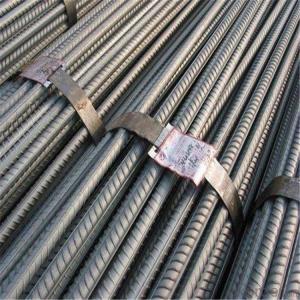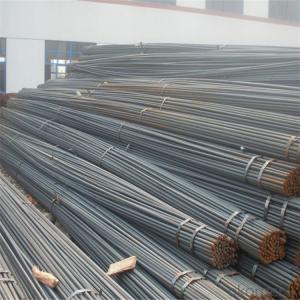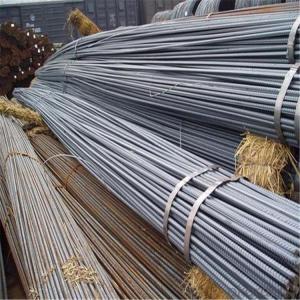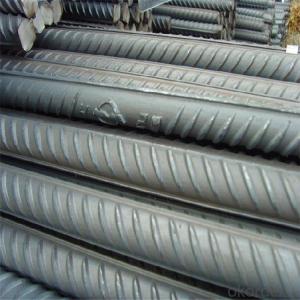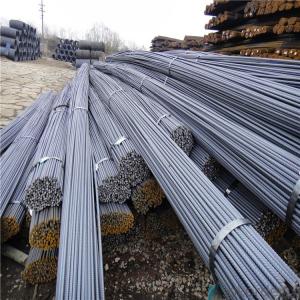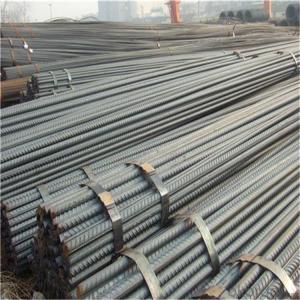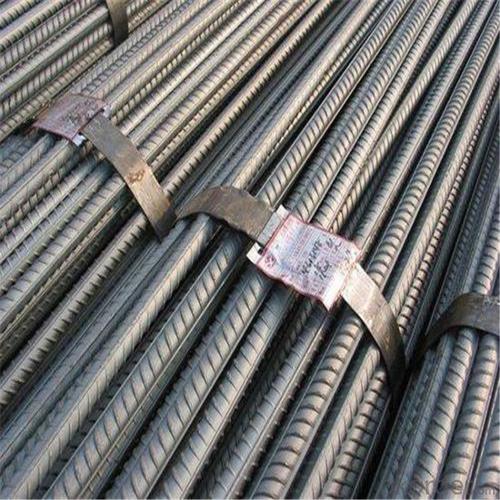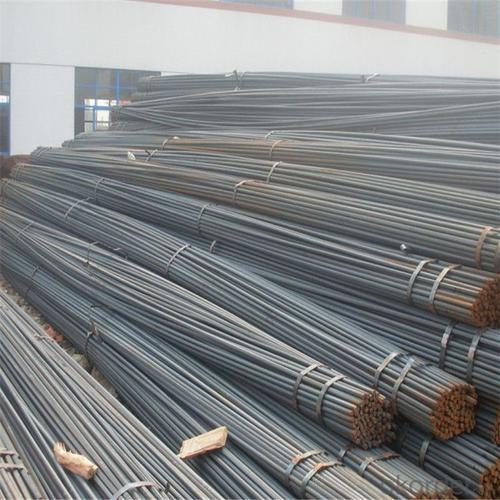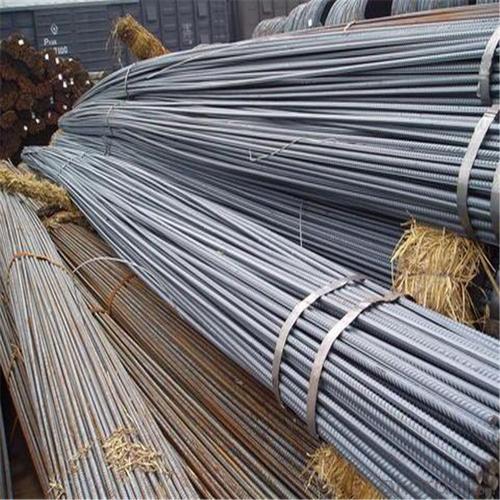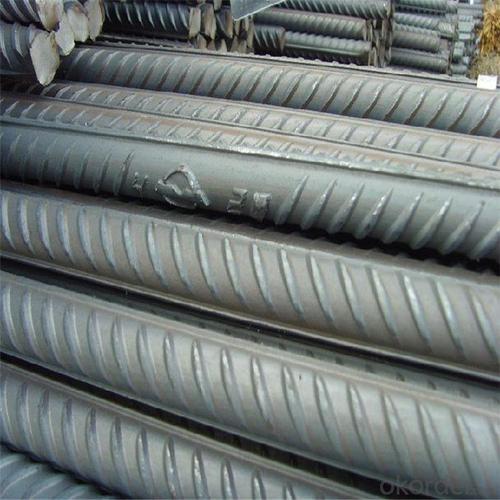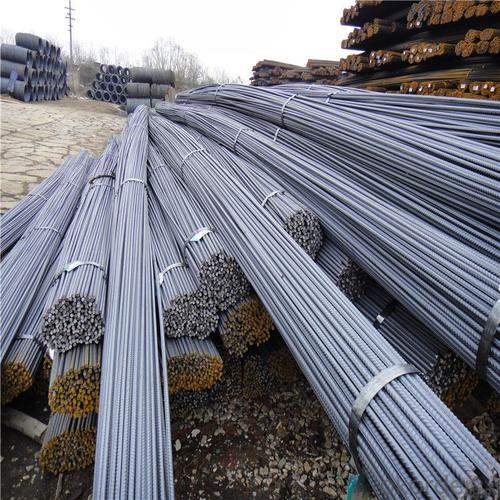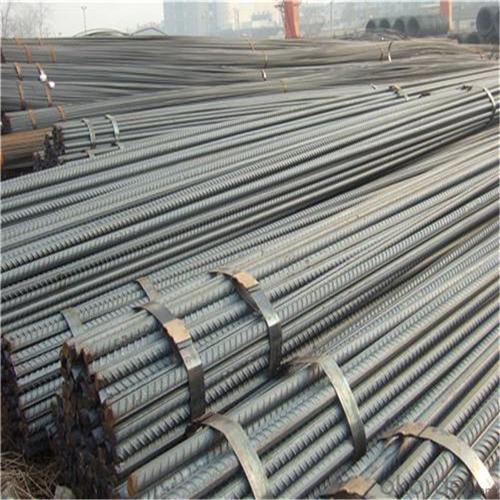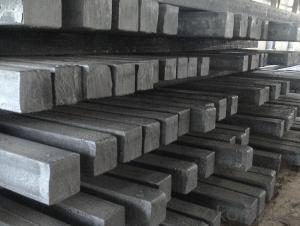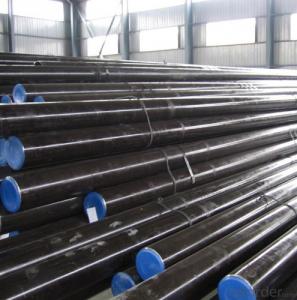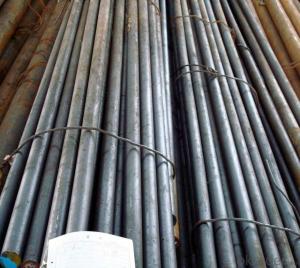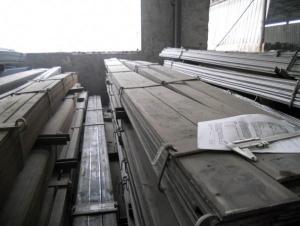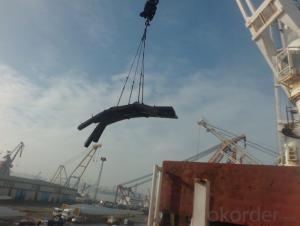Hot Rolled Rebar Screw Thread Steel Bar
- Loading Port:
- Tianjin
- Payment Terms:
- TT OR LC
- Min Order Qty:
- 100 m.t.
- Supply Capability:
- 50000 m.t./month
OKorder Service Pledge
OKorder Financial Service
You Might Also Like
Specification
Description of Thread Steel Bar
1, Diameter: 5.5mm-10mm Thread Steel Bar
10m- 40mm Thread Steel Bar
2, Length: 6m, 9m, 12m or customized
3, Standard: GB, ASTM, AISI, SAE, DIN, JIS, EN
OEM technology - send detailed technical parameters for accurate quotation.
2, Produce Process: smelt iron - EAF smelt billet - ESR smelt billet -
hot rolled or forged to get the steel round bar and plate
3, Heat Treatment: annealing, normalizing, tempering, quenching
4, Surface Treatment: Black
5, Quality Assurance: We accept third party inspection for all orders.
You can ask testing organizations such as SGS, BV, etc. to test our products before shipping.
Chemical Composition of Thread Steel Bar
Grade | Technical data of the original chemical composition(%) | |||||
Reinforcing steel bar HRB335 | C | Mn | Si | S | P | B |
≤0.25 | ≤1.60 | ≤0.80 | ≤0.045 | ≤0.045 | >0.0008 | |
Physics Capability | ||||||
Yield Strength(N/cm2) | Tensile Strength(N/cm2) | Elongation(%) | ||||
≥ 335 | ≥490 | ≥16 | ||||
Reinforcing steel bar HRB400 | C | Mn | Si | S | P | B |
≤0.25 | ≤0.16 | ≤0.80 | ≤0.045 | ≤0.045 | 0.04-0.12 | |
Physics Capability | ||||||
Yield Strength(N/cm2) | Tensile Strength(N/cm2) | Elongation(%) | ||||
≥ 400 | ≥ 570 | ≥ 14 | ||||
Products Show of Thread Steel Bar
Company Information
CNBM International Corporation is the most important trading platform of CNBM group.
Whith its advantages, CNBM International are mainly concentrate on Cement, Glass, Iron and Steel, Ceramics industries and devotes herself for supplying high qulity series of refractories as well as technical consultancies and logistics solutions.


F A Q
1, Your advantages?
professional products inquiry, products knowledge train (for agents), smooth goods delivery, excellent customer solution proposale
2, Test & Certificate?
SGS test is available, customer inspection before shipping is welcome, third party inspection is no problem
3, Factory or Trading Company?
CNBM is a trading company but we have so many protocol factories and CNBM works as a trading department of these factories. Also CNBM is the holding company of many factories.
4, Payment Terms?
30% TT as deposit and 70% before delivery.
Irrevocable L/C at sight.
5, Trading Terms?
EXW, FOB, CIF, FFR, CNF
6, After-sale Service?
CNBM provides the services and support you need for every step of our cooperation. We're the business partner you can trust.
For any problem, please kindly contact us at any your convenient time.
We'll reply you in our first priority within 24 hours.
- Q: What are the different forging grades of special steel?
- There are several different forging grades of special steel, each with its own unique characteristics and applications. Some of the most commonly used forging grades include: 1. Carbon Steel: Carbon steel is a popular choice for forging due to its high strength and durability. It contains various amounts of carbon, which determine its hardness and toughness. Carbon steel forgings are commonly used in automotive parts, construction equipment, and machinery. 2. Alloy Steel: Alloy steel is made by adding various alloying elements to carbon steel, such as manganese, chromium, nickel, or molybdenum. This enhances its strength, corrosion resistance, and wear resistance. Alloy steel forgings are widely used in aerospace, defense, oil and gas, and power generation industries. 3. Stainless Steel: Stainless steel is a corrosion-resistant steel alloy that contains a minimum of 10.5% chromium. It is highly resistant to rust and staining, making it suitable for applications in harsh environments or where hygiene is critical. Stainless steel forgings are commonly used in the food processing, chemical, and medical industries. 4. Tool Steel: Tool steel is specifically designed for use in cutting tools, molds, and dies. It has high hardness, wear resistance, and toughness, allowing it to withstand high temperatures and heavy loads. Tool steel forgings are used in the manufacturing of drills, saw blades, punches, and various precision tools. 5. High-Speed Steel: High-speed steel is a type of tool steel that is capable of cutting at high speeds without losing its hardness. It contains additional elements like tungsten, molybdenum, or vanadium, which improve its heat resistance and wear resistance. High-speed steel forgings are used in the production of cutting tools, drills, and milling cutters. 6. Maraging Steel: Maraging steel is a low-carbon, high-nickel steel alloy known for its exceptional strength and toughness. It is heat-treated to achieve high tensile strength while maintaining good ductility. Maraging steel forgings are commonly used in aerospace, defense, and missile systems. These are just a few examples of the different forging grades of special steel available in the market. Each grade offers specific properties suited to different applications, ensuring that the right material can be selected for the desired performance and durability requirements.
- Q: Can special steel be used in the chemical processing industry?
- Yes, special steel can be used in the chemical processing industry. Special steel alloys, such as stainless steel, offer excellent corrosion resistance and high strength, making them suitable for various applications in chemical plants. These steels can withstand the harsh conditions, chemicals, and high temperatures typically encountered in chemical processing, ensuring the safety and efficiency of the operations.
- Q: How does special steel contribute to the industrial machinery aftermarket industry?
- Special steel plays a crucial role in the industrial machinery aftermarket industry by providing high-quality, durable, and customized components that are essential for repairing and maintaining machinery. Its unique properties, such as high strength, toughness, corrosion resistance, and heat resistance, enable the production of precision components that can withstand heavy industrial usage. This contributes to the efficiency, reliability, and longevity of machinery, reducing downtime and overall costs for businesses in the aftermarket industry.
- Q: What are the main factors affecting the creep resistance of special steel?
- The main factors affecting the creep resistance of special steel are the alloy composition, the microstructure, and the processing conditions. The specific combination of alloying elements and their concentrations significantly influence the material's ability to resist deformation under elevated temperatures and constant stress. Additionally, the microstructure, including grain size and distribution, plays a crucial role in determining the material's creep resistance. The processing conditions, such as heat treatment and thermal cycling, can further affect the creep performance by altering the material's microstructure and mechanical properties.
- Q: How does special steel contribute to reducing product failure?
- Special steel contributes to reducing product failure by providing enhanced strength, durability, and resistance to various external factors such as corrosion, wear, and extreme temperatures. Its unique properties make it suitable for critical components and applications where failure could have severe consequences. By using special steel in the manufacturing process, products are less likely to fail prematurely, ensuring reliability, safety, and ultimately reducing the risk of accidents or malfunctions.
- Q: What are the different marine grades of special steel?
- There are several different marine grades of special steel that are specifically designed to withstand the harsh conditions of marine environments. These grades are typically categorized based on their corrosion resistance and mechanical properties. One of the most commonly used marine grades of special steel is 316 stainless steel. It contains a higher percentage of molybdenum and nickel, which enhances its resistance to corrosion from saltwater and other harsh chemicals. This grade is often used for marine hardware, such as bolts, nuts, and screws, as well as for marine structures and equipment. Another marine grade of special steel is 2205 duplex stainless steel. This grade has a higher strength and better corrosion resistance compared to 316 stainless steel. It is often used in marine applications that require high strength and durability, such as propeller shafts, offshore structures, and pressure vessels. There is also 5083 aluminum-magnesium alloy, which is commonly used in marine applications where weight is a concern. This grade of special steel offers excellent corrosion resistance and high strength, making it suitable for boat hulls, superstructures, and other lightweight marine components. Additionally, there are various high-strength low-alloy (HSLA) steels that are used in marine applications. These steels are specifically designed to provide superior strength and toughness while also offering good corrosion resistance. They are often used for shipbuilding, offshore drilling rigs, and other marine structures that require high strength and durability. Overall, the different marine grades of special steel provide a range of options for various marine applications. The choice of grade depends on the specific requirements of the project, including the level of corrosion resistance, strength, and weight considerations.
- Q: What are the properties of magnetic alloy steel?
- Magnetic alloy steel possesses magnetic properties due to its composition of iron and other elements such as nickel, cobalt, and chromium. These alloys are known for their high magnetism, excellent strength, and resistance to corrosion. They have a wide range of applications in industries like electrical engineering, automotive, and aerospace, where their magnetic properties are crucial for tasks like generating and directing magnetic fields, magnetic shielding, and producing high-performance magnets.
- Q: How does special steel contribute to the agricultural machinery industry?
- The agricultural machinery industry heavily relies on special steel to improve the overall efficiency, durability, and productivity of agricultural equipment. A major advantage of special steel in this industry is its exceptional strength and toughness, which allows for the production of robust and reliable machinery. Agricultural equipment, including tractors, combines, and harvesters, often faces intense operational conditions such as heavy loads, extreme temperatures, and exposure to corrosive elements. Special steel provides the necessary strength and resistance to withstand these challenging environments, ensuring optimal performance for extended periods. Furthermore, special steel alloys offer excellent wear resistance, enabling agricultural machinery to endure the abrasive nature of farming operations. This is especially crucial for components like blades, plows, and tillage tools, which are constantly exposed to soil, rocks, and other abrasive materials. By utilizing high-quality special steel, manufacturers can manufacture durable and long-lasting equipment, reducing maintenance requirements and improving the overall reliability of agricultural machinery. In addition, special steel allows for the development and construction of more efficient agricultural machinery. Thanks to its superior strength-to-weight ratio, special steel facilitates the production of lighter yet robust equipment. Consequently, this improves fuel efficiency, reduces energy consumption, and enhances maneuverability. Moreover, special steel's excellent machinability and formability enable manufacturers to create intricate and customized components, meeting specific agricultural needs and increasing machinery efficiency. Moreover, special steel contributes to the agricultural machinery industry by providing resistance to corrosion and rust. Agricultural equipment is often exposed to moisture, fertilizers, and chemicals, which can result in corrosion and degradation over time. Special steel alloys with corrosion-resistant properties, such as stainless steel, can significantly prolong the lifespan of machinery and reduce maintenance costs. In conclusion, special steel is indispensable for the agricultural machinery industry as it enhances the durability, efficiency, and productivity of equipment. Its strength, wear resistance, design flexibility, and corrosion-resistant properties make it the preferred choice for manufacturing high-quality machinery capable of withstanding the demanding conditions of agricultural operations.
- Q: How is special steel used in the mining supply chain?
- Special steel is used extensively in the mining supply chain due to its exceptional strength, durability, and resistance to corrosion. It is utilized in various equipment and machinery used for exploration, extraction, processing, and transportation of minerals. Special steel is commonly employed in mining tools, drill bits, conveyor systems, crushers, grinding mills, and pumps, ensuring efficient and reliable operations in challenging mining environments.
- Q: What are the requirements for special steel used in defense equipment manufacturing?
- The requirements for special steel used in defense equipment manufacturing typically include high strength and durability, resistance to corrosion and wear, good toughness and impact resistance, as well as the ability to withstand extreme temperatures and harsh environments. Additionally, the steel must meet stringent quality control standards and industry specifications to ensure its reliability and performance in critical defense applications.
Send your message to us
Hot Rolled Rebar Screw Thread Steel Bar
- Loading Port:
- Tianjin
- Payment Terms:
- TT OR LC
- Min Order Qty:
- 100 m.t.
- Supply Capability:
- 50000 m.t./month
OKorder Service Pledge
OKorder Financial Service
Similar products
Hot products
Hot Searches
Related keywords
